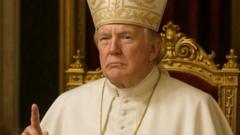As universities and law firms are forced into compromising positions, they are beginning to push back against political pressure.
Trump's Pressure Tactics: Universities and Law Firms in a Dilemma

Trump's Pressure Tactics: Universities and Law Firms in a Dilemma
The implications of President Trump's retribution campaign against higher education and legal institutions.
In a striking turn of events, American universities and law firms are grappling with the repercussions of President Trump's bold tactics aimed at punishing those who oppose him. His administration has initiated a campaign targeting institutions that engage in what the president labels as "woke" policies or antisemitic behavior. This shift has left several universities and major law firms with a difficult choice: either submit to the administration's demands or risk facing harsher consequences.
Columbia University and some of the nation’s largest law firms opted for early deals with the administration, believing they could mitigate the fallout. Meanwhile, other institutions remained silent, hoping to avoid Trump’s wrath. Recently, however, the narrative has started to change dramatically. Harvard University emerged as the first major institution to openly defy the administration, labeling its demands as "illegal." Following Harvard's lead, over 400 university leaders banded together, releasing a unified statement condemning what they see as unprecedented government encroachment into academic freedom.
In the legal arena, several large law firms have initiated lawsuits to block executive orders targeting their operations. These firms have successfully secured temporary injunctions, and countless others have rallied in support. Furthermore, in a significant shift, tech giant Microsoft decided to sever ties with a law firm that had previously made a deal with the White House, opting instead to collaborate with one of the dissenting firms, indicating a strong stance against capitulation.
As these prominent institutions begin to stand up against Trump's directives, the outcomes of their actions could have lasting implications for the landscape of American education and law. The growing unity among universities and law firms may signal a pivotal moment in the fight against political interference in academia and legal practice.
Columbia University and some of the nation’s largest law firms opted for early deals with the administration, believing they could mitigate the fallout. Meanwhile, other institutions remained silent, hoping to avoid Trump’s wrath. Recently, however, the narrative has started to change dramatically. Harvard University emerged as the first major institution to openly defy the administration, labeling its demands as "illegal." Following Harvard's lead, over 400 university leaders banded together, releasing a unified statement condemning what they see as unprecedented government encroachment into academic freedom.
In the legal arena, several large law firms have initiated lawsuits to block executive orders targeting their operations. These firms have successfully secured temporary injunctions, and countless others have rallied in support. Furthermore, in a significant shift, tech giant Microsoft decided to sever ties with a law firm that had previously made a deal with the White House, opting instead to collaborate with one of the dissenting firms, indicating a strong stance against capitulation.
As these prominent institutions begin to stand up against Trump's directives, the outcomes of their actions could have lasting implications for the landscape of American education and law. The growing unity among universities and law firms may signal a pivotal moment in the fight against political interference in academia and legal practice.



















